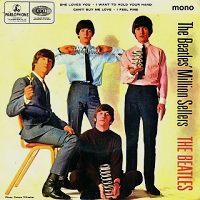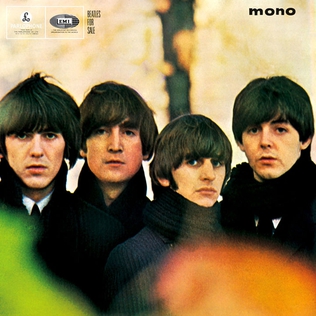
Beatles for Sale is the fourth studio album by the English rock band the Beatles. It was released on 4 December 1964 in the United Kingdom on EMI's Parlophone label. The album marked a departure from the upbeat tone that had characterised the Beatles' previous work, partly due to the band's exhaustion after a series of tours that had established them as a worldwide phenomenon in 1964. Beatles for Sale was not widely available in the US until 1987, when the Beatles' catalogue was standardised for release on CD. Instead, eight of the album's fourteen tracks appeared on Capitol Records' concurrent release, Beatles '65, issued in North America only.
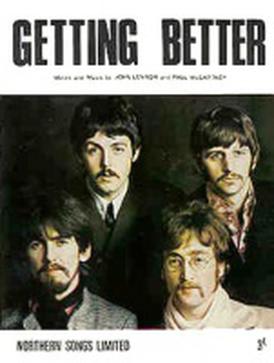
"Getting Better" is a song by the English rock band the Beatles from their 1967 album Sgt. Pepper's Lonely Hearts Club Band. It was written mainly by Paul McCartney, with some of the lyrics written by John Lennon, and credited to the Lennon–McCartney partnership.
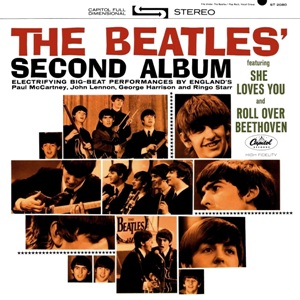
The Beatles' Second Album is the second Capitol Records album by the English rock band the Beatles, and their third album released in the United States including Introducing... The Beatles, which was issued three months earlier by Vee-Jay Records. Following its release in April 1964, The Beatles' Second Album replaced Meet the Beatles! at number 1 on the Billboard Top LPs chart in the US. The album was compiled mostly from leftover tracks from the UK album With the Beatles and Long Tall Sally EP, which are predominantly rock and roll and R&B covers, and rounded out with several Lennon-McCartney-penned non-album b-sides and the hit single "She Loves You". Among critics, it is considered the band's purest rock and roll album and praised for its soulful takes on both contemporary black music hits and original material.

"I Feel Fine" is a song by the English rock band the Beatles that was released in November 1964 as the A-side of their eighth single. It was written by John Lennon and credited to the Lennon–McCartney partnership. The recording includes one of the earliest uses of guitar feedback in popular music.
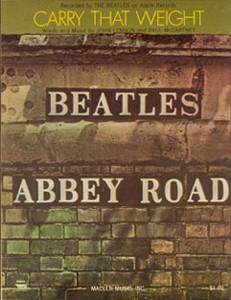
"Carry That Weight" is a song by the English rock band the Beatles from their 1969 album Abbey Road. Written by Paul McCartney and credited to Lennon–McCartney, it is the seventh and penultimate song in the album's climactic side-two medley. It features unison vocals in the chorus from all four Beatles, a rarity in their songs. It is preceded by "Golden Slumbers" and segues into "The End".
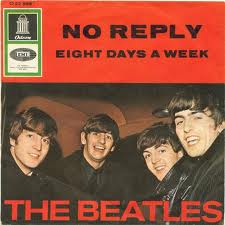
"No Reply" is a song by the English rock band the Beatles from their 1964 album Beatles for Sale. In North America, it was issued on Capitol Records' variant on the British release, Beatles '65. The song was written mainly by John Lennon and credited to Lennon–McCartney. Lennon originally gave the song to another artist managed by Brian Epstein, Tommy Quickly, in June 1964, but Quickly decided not to use it. The Beatles recorded the track in London soon after returning from their first full tour of the United States. The lyrics typify Lennon's more introspective and mature songwriting on the Beatles for Sale album.

"Baby's in Black" is a song by the English rock band the Beatles, co-written by John Lennon and Paul McCartney. It appears on the United Kingdom album Beatles for Sale and on the United States album Beatles '65, both released in 1964.
"Mr. Moonlight" is a song written by Roy Lee Johnson and recorded by Dr. Feelgood and the Interns in 1962. The song was covered by the Beatles on their 1964 albums Beatles for Sale and Beatles '65.
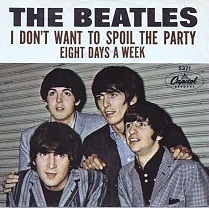
"I Don't Want to Spoil the Party" is a song by the English rock band the Beatles, written by John Lennon and credited to Lennon–McCartney. It was featured as the twelfth track on the 1964 album Beatles for Sale. "I Don't Want to Spoil the Party" was also released on the Beatles for Sale EP. It was later released as the B-side of the US single "Eight Days a Week", and then as the fifth track on the North America-only album Beatles VI. The song reached number 39 on the Billboard Hot 100.
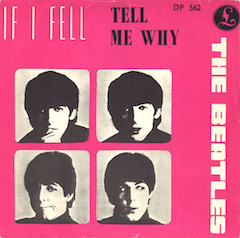
"Tell Me Why" is a song by English rock band the Beatles from their album A Hard Day's Night. In North America, it was released on both the American version of A Hard Day's Night and the album Something New. Credited to Lennon–McCartney, it was written by John Lennon in either Paris or New York City, and recorded in eight takes on 27 February 1964.

"When I Get Home" is a song written by John Lennon, and recorded by the English rock band the Beatles on 2 June 1964, during the last session for their third studio album A Hard Day's Night (1964). Its first US release was on the Something New LP.
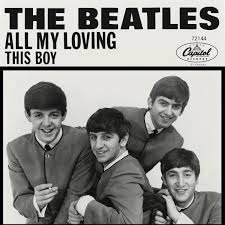
"All My Loving" is a song by the English rock band the Beatles, from their second UK album With the Beatles (1963). It was written by Paul McCartney, and produced by George Martin. Though not officially released as a single in the United Kingdom or the United States, the song drew considerable radio airplay, prompting EMI to issue it as the title track of an EP. The song was released as a single in Canada, where it became a number one hit. The Canadian single was imported into the US in enough quantities to peak at number 45 on the US Billboard Hot 100 in April 1964.
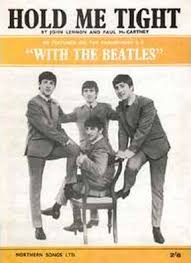
"Hold Me Tight" is a song by the English rock band the Beatles from their 1963 album With the Beatles. It was first recorded during the Please Please Me album session, but not selected for inclusion and re-recorded for their second album.
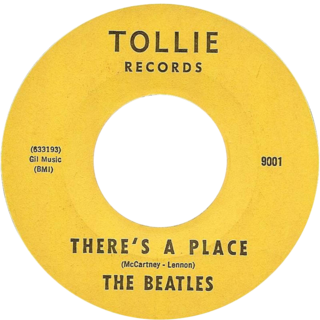
"There's a Place" is a song by the English rock band the Beatles from their debut album, Please Please Me, released in March 1963. It was written primarily by John Lennon and credited to McCartney–Lennon. In the United States, the song was released in July 1963 on the group's first US LP, Introducing... The Beatles, later reissued in January 1964 as Beatlemania surged there. It was also issued as a non-album single in the US, in March 1964, as the B-side to "Twist and Shout", reaching number 74 in the Billboard Hot 100.

"I'm a Loser" is a song by the English rock band the Beatles, originally released on Beatles for Sale in the United Kingdom, later released on Beatles '65 in the United States, both in 1964. Written by John Lennon, and credited to Lennon–McCartney, it was considered for release as a single until Lennon wrote "I Feel Fine".

"I'll Get You" is a song by the English rock band the Beatles, written by John Lennon and Paul McCartney, and released by the Beatles as the B-side of their 1963 single "She Loves You". The song was initially titled "Get You in the End".

"Yes It Is" is a song by the English rock band the Beatles. Written by John Lennon, it was first released in 1965 as the B-side to "Ticket to Ride". It features some of the Beatles' most complex and dissonant three-part vocal harmonies and showcases George Harrison's early use of volume pedal guitar. Ian MacDonald describes the song as having "rich and unusual harmonic motion."
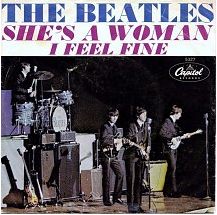
"She's a Woman" is a song by the English rock band the Beatles, written primarily by Paul McCartney and credited to Lennon–McCartney. It was released on a non-album single in November 1964 as the B-side to "I Feel Fine", except in North America, where it also appeared on the album Beatles '65, released in December 1964. Though it was the B-side, it charted in the US, reaching number four on the Billboard Hot 100 and number eight on the Cash Box Top 100. The song originated in McCartney's attempt to write a song in the style of Little Richard. The lyrics include the first reference to drugs in a Beatles song, with the line "turn(s) me on" referring to marijuana.

"All Together Now" is a song by the English rock band the Beatles written primarily by Paul McCartney and credited to the Lennon–McCartney partnership. The song was recorded during the band's Magical Mystery Tour period, but remained unreleased until it was included on the Yellow Submarine soundtrack. It was released as a single in 1972 in European countries such as France and Germany, backed by "Hey Bulldog".
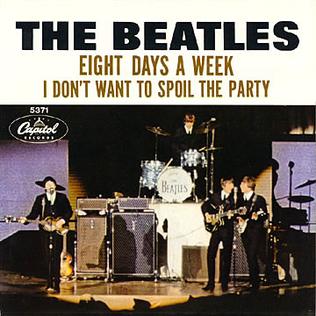
"Eight Days a Week" is a song by the English rock band the Beatles. It was written by Paul McCartney and John Lennon based on McCartney's original idea. It was released in December 1964 on the album Beatles for Sale, except in the United States and Canada, where it was first issued as a single A-side in February 1965 before appearing on the album Beatles VI. The song was the band's seventh number 1 single on the Billboard Hot 100, a run of US chart success achieved in just over a year. The single was also number 1 in Canada, Belgium and the Netherlands.
